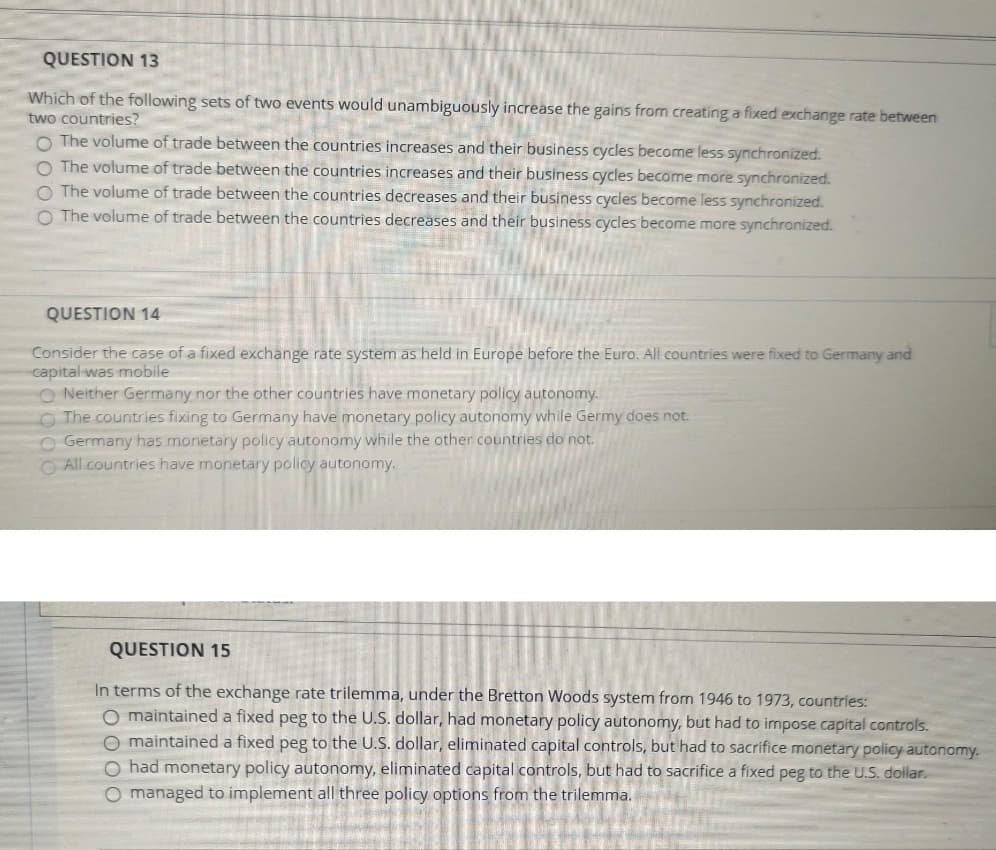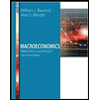Britain was on a fixed exchange rate in the early 1990's with Germany. Why did the reunification in Germany in the early 1990s and the resulting higher German interest rates cause a macroeconomic policy dilemma in Britain O Lower interest rates in Germany meant that Britain had to increase its money supply. O Lower interest rates in Germany meant that Britain had to cut its money supply. O Higher interest rates in Germany meant that Britain had to increase its money supply. O Higher interest rates in Germany meant that Britain had to cut its money supply O None of the above
Britain was on a fixed exchange rate in the early 1990's with Germany. Why did the reunification in Germany in the early 1990s and the resulting higher German interest rates cause a macroeconomic policy dilemma in Britain O Lower interest rates in Germany meant that Britain had to increase its money supply. O Lower interest rates in Germany meant that Britain had to cut its money supply. O Higher interest rates in Germany meant that Britain had to increase its money supply. O Higher interest rates in Germany meant that Britain had to cut its money supply O None of the above
Principles of Economics 2e
2nd Edition
ISBN:9781947172364
Author:Steven A. Greenlaw; David Shapiro
Publisher:Steven A. Greenlaw; David Shapiro
Chapter29: Exchange Rates And International Capital Flows
Section: Chapter Questions
Problem 25CTQ: If a countrys currency is expected to appreciate in value, what would you think will be the impact...
Related questions
Question
please do it in 10 minutes will upvote

Transcribed Image Text:QUESTION 12
Britain was on a fixed exchange rate in the early 1990's with Germany. Why did the reunification in Germany in the early 1990s
and the resulting higher German interest rates cause a macroeconomic policy dilemma in Britain
O Lower interest rates in Germany meant that Britain had to increase its money supply.
O Lower interest rates in Germany meant that Britain had to cut its money supply.
O Higher interest rates in Germany meant that Britain had to increase its money supply.
Higher interest rates in Germany meant that Britain had to cut its money supply
None of the above

Transcribed Image Text:QUESTION 13
Which of the following sets of two events would unambiguously increase the gains from creating a fixed exchange rate between
two countries?
O The volume of trade between the countries increases and their business cycles become less synchronized.
O The volume of trade between the countries increases and their business cycles become more synchronized.
O The volume of trade between the countries decreases and their business cycles become less synchronized.
O The volume of trade between the countries decreases and their business cycles become more synchronized.
QUESTION 14
Consider the case of a fixed exchange rate system as held in Europe before the Euro. All countries were fixed to Germany and
capital was mobile
O Neither Germany nor the other countries have monetary policy autonomy.
O The countries fixing to Germany have monetary policy autonomy while Germy does not.
O Germany has monetary policy autonomy while the other countries do not.
O All countries have monetary policy autonomy.
QUESTION 15
In terms of the exchange rate trilemma, under the Bretton Woods system from 1946 to 1973, countries:
O maintained a fixed peg to the U.S. dollar, had monetary policy autonomy, but had to impose capital controls.
O maintained a fixed peg to the U.S. dollar, eliminated capital controls, but had to sacrifice monetary policy autonomy.
O had monetary policy autonomy, eliminated capital controls, but had to sacrifice a fixed peg to the U.S. dollar.
O managed to implement all three policy options from the trilemma.
Expert Solution
This question has been solved!
Explore an expertly crafted, step-by-step solution for a thorough understanding of key concepts.
This is a popular solution!
Trending now
This is a popular solution!
Step by step
Solved in 2 steps

Knowledge Booster
Learn more about
Need a deep-dive on the concept behind this application? Look no further. Learn more about this topic, economics and related others by exploring similar questions and additional content below.Recommended textbooks for you

Principles of Economics 2e
Economics
ISBN:
9781947172364
Author:
Steven A. Greenlaw; David Shapiro
Publisher:
OpenStax

Brief Principles of Macroeconomics (MindTap Cours…
Economics
ISBN:
9781337091985
Author:
N. Gregory Mankiw
Publisher:
Cengage Learning

Principles of Economics, 7th Edition (MindTap Cou…
Economics
ISBN:
9781285165875
Author:
N. Gregory Mankiw
Publisher:
Cengage Learning

Principles of Economics 2e
Economics
ISBN:
9781947172364
Author:
Steven A. Greenlaw; David Shapiro
Publisher:
OpenStax

Brief Principles of Macroeconomics (MindTap Cours…
Economics
ISBN:
9781337091985
Author:
N. Gregory Mankiw
Publisher:
Cengage Learning

Principles of Economics, 7th Edition (MindTap Cou…
Economics
ISBN:
9781285165875
Author:
N. Gregory Mankiw
Publisher:
Cengage Learning

Principles of Macroeconomics (MindTap Course List)
Economics
ISBN:
9781285165912
Author:
N. Gregory Mankiw
Publisher:
Cengage Learning

Macroeconomics: Principles and Policy (MindTap Co…
Economics
ISBN:
9781305280601
Author:
William J. Baumol, Alan S. Blinder
Publisher:
Cengage Learning

Principles of Economics (MindTap Course List)
Economics
ISBN:
9781305585126
Author:
N. Gregory Mankiw
Publisher:
Cengage Learning